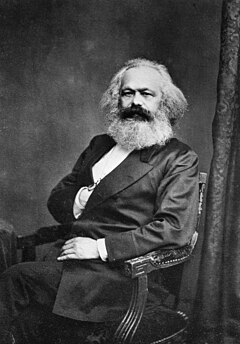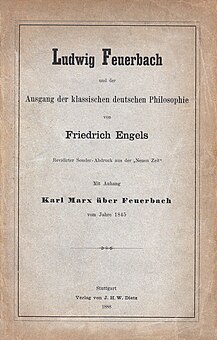Related Research Articles

Karl Heinrich Marx was a German philosopher, critic of political economy, economist, historian, sociologist, political theorist, journalist and socialist revolutionary. His best-known titles are the 1848 pamphlet The Communist Manifesto and the three-volume Das Kapital (1867–1883). Marx's political and philosophical thought had enormous influence on subsequent intellectual, economic, and political history. His name has been used as an adjective, a noun, and a school of social theory.

The Communist Manifesto, originally the Manifesto of the Communist Party, is an 1848 pamphlet by German philosophers Karl Marx and Friedrich Engels. Commissioned by the Communist League and originally published in London just as the Revolutions of 1848 began to erupt, the Manifesto was later recognised as one of the world's most influential political documents. It presents an analytical approach to the class struggle and the conflicts of capitalism and the capitalist mode of production, rather than a prediction of communism's potential future forms.

Friedrich Engels, sometimes anglicised as Frederick Engels, was a German philosopher, critic of political economy, historian, political theorist and revolutionary socialist. He was also a businessman, journalist and political activist, whose father was an owner of large textile factories in Salford and Barmen, Prussia.

The Neue Rheinische Zeitung: Organ der Demokratie was a German daily newspaper, published by Karl Marx in Cologne between 1 June 1848 and 19 May 1849. It is recognised by historians as one of the most important dailies of the Revolutions of 1848 in Germany. The paper was regarded by its editors and readers as the successor of an earlier Cologne newspaper, the Rheinische Zeitung, also edited for a time by Karl Marx, which had been suppressed by state censorship over five years earlier.
Karl Heinrich Pfänder He was an artist and a prominent figure in the German and international working class movement. He was a friend and associate of both Karl Marx and Frederick Engels. Pfänder emigrated to London, England in 1845. He was a member of the German Workers Educational Society in London. He was a member of the Central Authority of the Communist League and was also a member of the General Council of the First International. Karl Pfander died in 1876.
August Hermann Ewerbeck, known by his middle name of Hermann, was a pioneer socialist political activist, writer, and translator. A physician by vocation and a German by birth, Ewerbeck is best remembered as an early political associate of Karl Marx and Friedrich Engels, as a leader of the Parisian communities of the utopian socialist organization, League of the Just, and as the translator of the French writings of Étienne Cabet and Ludwig Feuerbach into German.
August Gebert was born in Mecklenburg, Germany and was a joiner by profession. He became a member of the Communist League while living in Switzerland. He continued to participate in the Communist League when he moved to London in 1850. There he became a part of the sectarian Willich-Schapper group within the Communist League, which is known for expelling Marx and Engels. In London he was the chair of the CABV Whitechapel branch.
Born in Germany, Albert Lehmann was a worker and a leading figure of the League of Just. Following the suppression of the uprising of 1848 and 1849, Lehmann fled Germany to settle in London, England. In London, he became a member of the German Workers Educational Society and a member of the Communist League. During the split in the Communist League, Lehmann joined the August Willich-Karl Schapper sectarian group as opposed to the Karl Marx and Frederick Engels group.

Friedrich Wilhelm German Mäurer was a German Communist writer and leader of the early German labor movement. He joined the League of Outlaws because of his democratic beliefs. When the League of Outlaws became the League of the Just, Mäurer became a member of the League of the Just. He wrote poetry for its newsletters and several books, and with Moses Hess was an important link between it and Karl Marx.
Peter Nothjung was a tailor in Cologne, Germany, where he joined the Cologne Workers' Association. Nothjung also became a member of the Communist League. As such, he served as an emissary between the Cologne Workers Association and the Central Authority of the Communist League. Nothjung later was accused by Prussian authorities of traitorous activities and became one of defendants in the "Cologne Communist Trial" in 1852.
Konrad Bernhard Schramm was a German socialist revolutionary and as a result a member of the Communist League. Following the suppression of the uprisings of 1848 and 1849, Schramm refugeed to London, England in 1849. He became a manager of the Neue Rheinische Zeitung: Politisch-ökonomische Revue. Schramm was also a friend and an associate of both Karl Marx and Frederick Engels.
Jakob Lukas Schabelitz was a Swiss publisher and bookseller. He joined the Communist League and was an associate and friend of Karl Marx and Frederick Engels in the late 1840s and early 1850s. Schabelitz died in 1899.
Johann Baer was a Germany revolutionary socialist. He became a member of the Communist League. Following the Revolution of 1848 and 1849, he fled to London. Baer lived in London throughout the early 1850s. He was an associate of both Karl Marx and Frederick Engels.
Adolph Joseph Maria Bermbach was a German lawyer and revolutionary who worked in Cologne. Bermbach, a member of the Communist League, was a correspondent of Karl Marx and kept him abreast of anti-communist trials in Cologne after Marx had moved to London. Bermbach also was a witness for the defence at that the Cologne Communist Trial. He studied legal science in Bonn from 1841 to 1844. Later he worked as a notary.

In Marxism, a theoretician is an individual who observes and writes about the condition or dynamics of society, history, or economics, making use of the main principles of Marxian socialism in the analysis.
The German Workers Educational Association (GWEA) was a London-based organisation of radical German political émigrés established in 1840 by Karl Schapper and his associates. The organisation served during its initial years as the "above-ground" arm of the underground League of the Just and later as a mass organisation of the Communist League. The organisation continued to exist for more than 75 years, eventually terminating in 1917 due to the internment of Germans in Great Britain due to World War I.

In Marxist philosophy, the dictatorship of the proletariat is a condition in which the proletariat holds state power. The dictatorship of the proletariat is the intermediate stage between a capitalist economy and a communist economy, whereby the post-revolutionary state seizes the means of production, compels the implementation of direct elections on behalf of and within the confines of the ruling proletarian state party, and instituting elected delegates into representative workers' councils that nationalise ownership of the means of production from private to collective ownership. During this phase, the administrative organizational structure of the party is to be largely determined by the need for it to govern firmly and wield state power to prevent counterrevolution and to facilitate the transition to a lasting communist society. Other terms commonly used to describe the dictatorship of the proletariat include socialist state, proletarian state, democratic proletarian state, revolutionary dictatorship of the proletariat and democratic dictatorship of the proletariat.

The Communist League was an international political party established on 1 June 1847 in London, England. The organisation was formed through the merger of the League of the Just, headed by Karl Schapper, and the Communist Correspondence Committee of Brussels, Belgium, in which Karl Marx and Friedrich Engels were the dominant personalities. The Communist League is regarded as the first Marxist political party and it was on behalf of this group that Marx and Engels wrote the Communist Manifesto late in 1847. The Communist League was formally disbanded in November 1852, following the Cologne Communist Trial.

The "Theses on Feuerbach" are eleven short philosophical notes written by Karl Marx as a basic outline for the first chapter of the book The German Ideology in 1845. Like the book for which they were written, the theses were never published in Marx's lifetime, seeing print for the first time in 1888 as an appendix to a pamphlet by his co-thinker Friedrich Engels. The document is best remembered for the epigrammatic 11th thesis and final line: "Philosophers have hitherto only interpreted the world in various ways; the point is to change it."

Wilhelm Christian Weitling was a German tailor, inventor, radical political activist and one of the first theorists of communism. Weitling gained fame in Europe as a social theorist before he emigrated to the United States.
References
- ↑ Biographical note contained in the Collected Works of Karl Marx and Frederick Engels: Volume 10 (International Publishers: New York, 1978) p. 738.